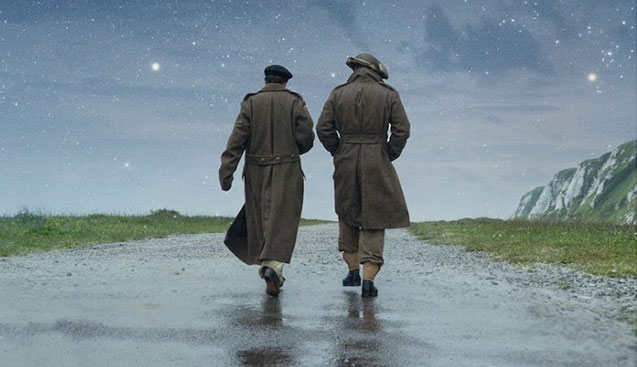Ian McDonald’s Time Was Tells a Poignant Story of Time-Lost Lovers
 From his very first book, 1988’s Desolation Road, Ian McDonald has impressed with novels exploring the impact of high technology on societies beyond the borders of the Western world, and people on the margins. Recently, he’s captured new readers (and Hollywood interest) with the Luna trilogy, a flashy mob drama on the moon, but he’s taken a small break from that three-part epic for Time Was, a slender, poignant queer romance incorporating time travel and hints of hard science.
From his very first book, 1988’s Desolation Road, Ian McDonald has impressed with novels exploring the impact of high technology on societies beyond the borders of the Western world, and people on the margins. Recently, he’s captured new readers (and Hollywood interest) with the Luna trilogy, a flashy mob drama on the moon, but he’s taken a small break from that three-part epic for Time Was, a slender, poignant queer romance incorporating time travel and hints of hard science.
Time Was
Time Was
By Ian McDonald
In Stock Online
Paperback $13.99
Emmett Leigh is a bibliophile book dealer in a modern style, which involves having an apartment so full of books (to be sold online) that the landlady fears for the structural safety of the place. He’s always on the hunt for what he calls provenances: clues in old books that offer up some idea as to the volume’s tangible history. As Time Was begins, he’s found something credible in a copy of a poetry book called, appropriately enough, Time Was, written by an anonymous author using the initials E.L. The book contains an intriguing love letter from “Tom” to “Ben,” offering hints of a love affair that took place in World War II-era Alexandria.
Emmett Leigh is a bibliophile book dealer in a modern style, which involves having an apartment so full of books (to be sold online) that the landlady fears for the structural safety of the place. He’s always on the hunt for what he calls provenances: clues in old books that offer up some idea as to the volume’s tangible history. As Time Was begins, he’s found something credible in a copy of a poetry book called, appropriately enough, Time Was, written by an anonymous author using the initials E.L. The book contains an intriguing love letter from “Tom” to “Ben,” offering hints of a love affair that took place in World War II-era Alexandria.
Unable to resist the clues offered in the letter, Emmett begins a hunt for the identity of the writer and subject, soon discovering they were soldiers lost and presumed dead following the explosion of an experimental anti-German weapon. Inquiries lead him to a woman named Thorn, whose grandfather’s papers contain documents related to the two men, revealing a version of the truth. But the story doesn’t end there: copies of Time Was can be found in a handful of bookstores, but each is given instructions that the books aren’t to be sold. And more than one has a letter folded in its pages. Ultimately, Emmett and Thorn discover Tom and Ben in old pictures and images scattered across the twentieth century—thought hey never appear to age. The point of view switches between Emmett and Thorn’s search, and the early days of the passionate love between Tom and Ben—lovers lost in time trying to reconnect across the decades.
Luna: New Moon
Luna: New Moon
By Ian McDonald
In Stock Online
Paperback $20.99
The novella, as a form, is under-appreciated. We tend to think of them as short novels, but truly, they’re a different beast altogether, with a unique style and rhythm of storytelling. Sometimes that means not allowing a story to overstay its welcome. Here, though, McDonald does something different: he tells a character-based story about the impact of a pair of time travelers on those who discover their existence. A full-length novel might have been consumed with the temporal mechanics and incidents in the lives of time-lost lovers; by eliding those details, this shorter work is, paradoxically, able to slow down and luxuriate in the story’s elegiac themes.
The novella, as a form, is under-appreciated. We tend to think of them as short novels, but truly, they’re a different beast altogether, with a unique style and rhythm of storytelling. Sometimes that means not allowing a story to overstay its welcome. Here, though, McDonald does something different: he tells a character-based story about the impact of a pair of time travelers on those who discover their existence. A full-length novel might have been consumed with the temporal mechanics and incidents in the lives of time-lost lovers; by eliding those details, this shorter work is, paradoxically, able to slow down and luxuriate in the story’s elegiac themes.
It’s also an impressively challenging book for its length, both in McDonald’s use of language, and in its timey-wimey overlapping narratives. A story from the point of view of poets and book lovers would fall flat if the novel’s language weren’t a match for the inner monologues you’d expect from people whose interior lives are so full of words. McDonald’s treatment of queer characters and themes has been impressive in his past works, and he continues that here; Tom and Ben are well-treated. Their queerness is taken as read, but they’re neither desexualized, nor swappable for straight characters.
McDonald succeeds in doing several seemingly incompatible things at once, and doing them well. Time Was is a time travel story that’s also, and primarily, a love story. Science fiction is typically plot-driven, occasionally to the exclusion of other elements, but this one luxuriates in characters and language. It’s a work that looks to the past, but speaks to the future of science fiction.

